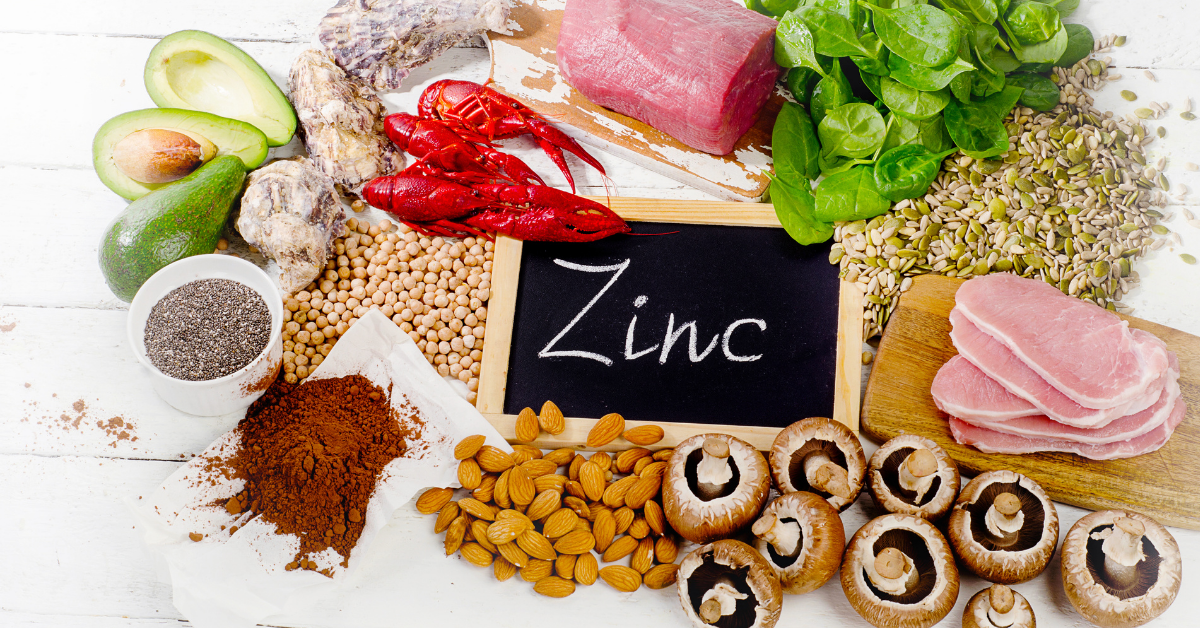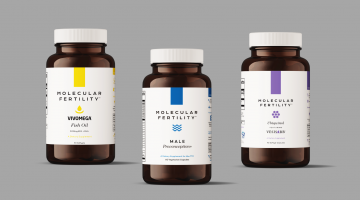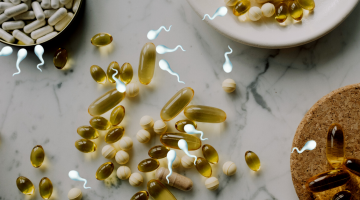Zinc and Sperm – Benefits for Male Fertility
We discuss various nutrients and dietary supplements in this article that may or may not be helpful. If you purchase recommended products, services, or treatments, it may benefit CNY Fertility financially. Read more about our financial relationships here. The supplements discussed in this article are not intended to treat, cure, or prevent any disease. If you are pregnant, take any medications, or have been diagnosed with a medical condition, consult with a healthcare provider before taking any dietary supplement.

Research has shown that levels of zinc and sperm quality are highly associated. Low zinc or zinc deficiency can negatively influence several factors that are directly related to male fertility like low testosterone and decreased sperm quality. As such, ensuring appropriate zinc levels can be an important aspect of achieving optimal sperm health and overall male fertility.
Zinc can be found in animal foods like meat or shellfish, and it is also a key ingredient in many male fertility supplements. This article will discuss and cover research on how zinc impacts sperm quality and everything you need to know to get more zinc pumping through your veins!
Fast Facts
- Males are constantly producing sperm. However, sperm take approximately 90 days to develop fully. Therefore, it is ideal if you can make changes targeting sperm health for 3+ months prior to trying to conceive.
- Sperm quality is subject to fluctuations in the testicular environment. The testicular environment is influenced by factors like nutrient levels, heat, toxins, and more.
- Zinc is a mineral with antioxidant properties that play a critical role in sperm development.
- Zinc levels are highly associated with increased sperm volume/count and other sperm parameters. Zinc and other nutrients can help to protect sperm from damaging effects caused by toxins.
- Research indicates zinc supplementation may help to improve sperm parameters and low testosterone levels.
Zinc and Male Fertility
Zinc is a mineral that is essential for the normal functioning of the male reproductive system. Several studies have been conducted to explore the relationship between zinc and male fertility. The results of these studies have shown that zinc levels in the seminal plasma are positively associated with male fertility and that zinc supplementation may significantly increase semen volume, sperm motility, and the percentage of normal sperm morphology.
Zinc Levels in Sperm and the Affect on Fertility
Zinc is normally found in high values in seminal fluid. In fact, studies have shown that zinc is at its highest concentration in human seminal plasma when compared to any other human tissue. The concentration of zinc in sperm also increases as sperm develop.
In one study, researchers tested the seminal plasma in men. Researchers found that seminal zinc levels were positively associated with male fertility. The results of the study indicated that poor zinc nutrition may contribute to low sperm quality.
In 2016, a group of researchers conducted a meta-analysis of 17 studies to explore the relationship between seminal plasma zinc and male fertility. Researchers found zinc concentrations in seminal plasma to be positively associated with male fertility.
Supplementing Zinc and Sperm
Since zinc plays such a vital role in sperm development, it makes sense that increased zinc levels can positively affect sperm quality. As previously mentioned, zinc can be obtained by eating different foods, but the best way to significantly increase zinc levels is by taking a zinc supplement. Supplementing zinc has been shown to have a direct effect on several different sperm parameters.
Based on the results of the meta-analysis of zinc and male fertility studies referenced above, researchers concluded that zinc supplementation significantly increased sperm volume, sperm motility, and percentage of normal sperm morphology.
Several other studies have shown that zinc supplementation may also improve sperm motility, specifically in subfertile men with idiopathic asthenozoospermia and/or oligozoospermia.
Zinc for Smokers
As you may know, smoking has been shown to decrease male fertility significantly. Research has shown that supplementing zinc may actually help to combat the damage caused by smoking on sperm quality. In one study, men who smoked but had appropriate zinc levels didn’t see the same negative effects on their sperm quality compared to men who smoked with low zinc.
Smoking increases the amount of harmful reactive oxygen species (ROS) in the body. ROS can cause oxidative stress which leads to reduced sperm quality. Researchers believe that zinc’s antioxidant properties help to reduce ROS which protects the sperm from damage. Zinc plays several vital roles throughout spermatogenesis (development of sperm), so it is no surprise that higher zinc levels are associated with better quality sperm.
Although zinc may help to reduce the damage caused by smoking, we still recommend stopping smoking if you are trying to conceive. And if you do smoke, you should certainly consider taking a zinc supplement while you quit!
Zinc for Low Testosterone and Heavy Exercisers
Research has shown that zinc may play a vital role in influencing male testosterone levels. Zinc supplementation has been shown to increase testosterone levels and sperm count for men with low zinc.
One common cause of low testosterone is over-exercising. Men who participate in excessive amounts of high-intensity exercise are more likely to experience low testosterone levels.
Research has shown that supplementing zinc can significantly improve the testosterone levels of men who participate in exhaustive exercise.
How to Get More Zinc
High levels of zinc are found in food like shellfish and beef, but it can be difficult to ensure appropriate zinc levels if you aren’t eating those foods regularly. Many men, especially vegetarians, do not obtain adequate amounts of zinc through their diet alone. In fact, 17.3% of the global population suffers from zinc deficiency.
In lieu of a high zinc diet, zinc supplements can help to increase zinc levels and ensure your sperm are getting the support they need to develop properly.
Foods High in Zinc
Check out the chart below for more information on foods high in Zinc. Percent daily values are based on the National Institute of Health’s recommended daily value for zinc of 11mg.
| Food | Zinc Per 100g (% of DV) |
| Oysters | 61mg (555%) |
| Beef (Chuck Steak) | 11mg (100%) |
|
Hemp Seeds |
10mg (90%) |
|
Chicken Leg |
2mg (20%) |
| Lean Pork Chops | 2mg (20%) |
| Low Fat Yogurt | 1mg (10%) |
| Shiitake Mushrooms | 1mg (10%) |
Supplements
As you can see, there is a quick and sharp decline in zinc-containing foods after beef. Many other vitamins and nutrients that are known to support male fertility are also difficult to ensure appropriate levels of through diet alone. For this reason, taking fertility supplements is a good way to fill gaps in your diet and ensure you are getting all the zinc and other nutrients you need to ensure optimal sperm health.
While you could take a supplement containing just Zinc, we recommend taking a comprehensive male preconception vitamin, like Molecular Fertility’s Male Preconception+. The Male Preconception + contains 25 mg of zinc (227% of recommended daily value) and is formulated with many other vitamins and nutrients designed to help support sperm health.
Our team of specialists at CNY Fertility developed Molecular Fertility supplements specifically to support fertility health.
Other Helpful Tips
Taking zinc supplements isn’t the only way to try and improve your fertility. Check out some of the recommendations below from our full guide on increasing sperm count, motility, morphology, and overall male fertility!
Cool It Down
When trying to improve your fertility, it is best to avoid situations that can raise the temperature of the testicles, like hot tubs, saunas, and other high heat situations. The testicles naturally have a lower temperature compared to the rest of the body. This low-temperature environment is ideal for the development of sperm.
Multiple studies have shown that heat exposure from hot tubs and saunas can negatively impact male fertility.
Stop Smoking
Smoking and fertility don’t mix! Smoking is known to negatively impact several aspects of male fertility, including sperm density, count motility, and, interestingly enough, the amount of zinc in sperm.
Limit Alcohol and Marijuana Use
When you are trying to get pregnant, it is best to limit both alcohol and marijuana use.
Several studies have shown that alcohol can cause a deterioration in sperm quality and negatively affect men’s overall sexual health. The good news is research also shows that stopping drinking can result in a drastic improvement in multiple different semen parameters
Research regarding marijuana’s impact on fertility is more limited, but still shows potential negative effects. There is research available that indicates marijuana may decrease sperm count, concentration, morphology, and motility.
Vitamin D, Get Some Sun
Vitamin D is an essential nutrient for support men’s overall health, especially their fertility. Unfortunately, studies have shown that around 40% of adults in the U.S. suffer from vitamin D deficiency, which can negatively impact male fertility. Obtaining appropriate levels of vitamin D through sunshine alone can be difficult, especially during the winter months.
As such, fertility specialists recommend taking vitamin D as part of a fertility supplement like Male Preconception+ or as a stand-alone supplement.
Other Vitamins to Increase Sperm Quality and Volume
Zinc is just one of many vitamins and nutrients that research has shown may increase sperm count, motility, and overall male fertility. Nutrients like Co-Q10, folate, Vitamins A, E, and C, and acetyl-l carnitine have also been shown to positively impact fertility and can be found in male fertility supplements.
When evaluating different male fertility supplements, look for products containing lots of different supportive ingredients. When different nutrients are taken in combination, it can maximize their beneficial effects leading to further increased male fertility.
The Bottom Line About Zinc for Men
Zinc is one of many essential nutrients and minerals for male fertility. Ensuring appropriate levels can be difficult to obtain through diet alone. Supplementing zinc has been shown to have multiple positive effects on sperm and overall male fertility. On the contrary, zinc deficiency is highly associated with reduced male fertility and decreased sperm quality.
Taking a zinc-containing fertility supplement is just one of many ways you can improve your overall fertility.




